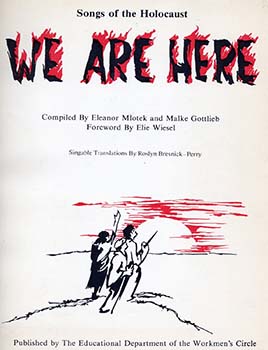Babi Yar, a ravine on the outskirts of Kiev where 33,771 Jews were machine gunned on September 29-30, 1941, became a mass grave for over 100,000 victims, the majority of them being Jews. Words to the song are by Shike Driz (1908-1971), Soviet Yiddish poet. Music is by Riva Boyarsky (1894-1967), Soviet Jewish composer.

Had I fastened
The cradle on a rafter,
And rocked it and rocked it,
My little son, my Yankl.
But the house has vanished
Into a fiery dome,
How then can I rock
My little son, my own?
Had I fastened
The cradle on a little tree,
And rocked it and rocked it
My little son, my Shleyml.
But nothing was left,
Not a thread from a sheet;
Nothing remained
Not a shoestring for my feet.
Had I shorn my long braids,
My hair untended,
Upon them the cradle,
The cradle suspended.
But where can I search for
The little bones to find them,
The little bones, the dear ones.
Of both my precious children.
Help me, mothers, help me
My mournful song to weep;
Help me, mothers. help me,
So Babi Yar may sleep.
Volt ikh oyfgehangen
Dos vigl af a balkn
Un gehoydet, gehoydet
Mayn yingele, mayn Yankl.
lz di shtub antrunen
Mit a flam fayer,
Vi zhe zol ikh hoyden
Mayn yingele, mayn tayers?
Volt ikh tsugebundn
Dos vigl af a beyml,
Un gehoydet, gehoydet
Mayn yingele, mayn Shleyml.
Iz mir nit farblibn
Keyn fodem fun keyn tsikh,
Iz mir nit geblibn
Keyn bendl fun keyn shikh.
Volt ikh opgeshorn
Di tsep mayne, di lange,
Un af zey dos vigl,
Dos vigl oyfgehangen.
Veys ikh nit, vu zukhn
Di beyndelekh atsinder.
Di beyndelekh, di tayere,
Fun beyde mayne kinder.
Helft mir mames, helft mir
Oysklogn mayn nign.
Helft mir, mames, helft mir
Dem Babi Var farvign.
װאָלט איך אױפֿגעהאַנגען
דאָס װיגל אױף אַ באַלקן
און געהױדעט, געהױדעט
מײַן ייִנגעלע, מײַן יאַנקל.
איז די שטוב אַנטרונען
מיט אַ פֿלאַם פֿײַער,
װי זשע זאָל איך הױדען,
מײַן ייִנגעלע, מײַן טײַערס?
װאָלט איך צוגעבונדן
דאָס װיגל אױף אַ בײמל,
און געהױדעט, געהױדעט,
מײן ייִנגעלע, מײַן שלמהל.
איז מיר ניט פֿאַרבליבן
קײן פֿאָדעם פֿון קײן ציך,
איז מיר ניט געבליבן
קײן בענדל פֿון קײן שיך.
װאָלט איך אָפּגעשאָרן
די צעפּ מײנע, די לאַנגע,
און אױף זײ דאָס װיגל,
דאָס װיגל אױפֿגעהאַנגען.
װײס איך ניט, װוּ זוכן
די בײנדעלעך אַצינדער,
די בײנדעלעך, די טײַערע,
פֿון בײדע מײַנע קינדער.
העלפֿט מיר, מאַמעס, העלפֿט מיר
אױסקלאָגן מײַן ניגון,
העלפֿט מיר, מאַמעס, העלפֿט מיר
דעם באַבי־יאַר פֿאַרװיגן.
Song Title: Babi Yar

Compiled by sisters Malke Gottleib and Chana Mlotek, this collection of 40 songs, issued on the occasion of the 40th anniversary of the Warsaw Ghetto Uprising, reflects the suffering, despair, longing, as well as the strength, hope and courage that led the last remnant of enfeebled Jews to take up arms against the mammoth Nazi war-machine. Save for five songs, this compilation comprises songs that were actually written or sung in the ghettos and concentration camps. Four exceptions written after the war: “Babi Yar,” “Moyshelekh un Shloymelekh,” “Kadish,” and “Mayn mame hot gevolt zayn oyf mayn khasene” are often presented at commemorative gatherings and were therefore included. The fifth song “Am Yisroel Khay” was written in a D.P. camp and is an affirmation of the will of the survivors to build new lives for themselves, holding high their belief in the endurance of the Jewish people. To enable readers and singers not conversant with the Yiddish alphabet to utilize this collection, We Are Here! Songs of the Holocaust provides parallel transliterations and singable English translations by Roslyn Bresnick Perry.